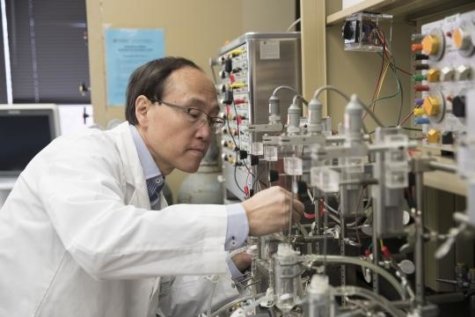Dr. Zhen Yan: “We cannot live in isolation forever.
Regular exercise has far more health benefits than we know.
The protection against this severe
respiratory disease condition
is just one of the many examples.”
CHARLOTTESVILLE, Va. —
Acute respiratory distress syndrome (ARDS) is one of
the major complications caused by COVID-19.
Even though only a small percentage of coronavirus
patients develop ARDS, the majority of those cases
end up in the intensive care unit. According to a
researcher at the University of Virginia School of
Medicine, regular exercise could hold the key to
keeping patients from developing deadly
complications like ARDS.
.
Dr. Zhen Yan says his research found a
powerful antioxidant that helps protect
against disease and can be
produced through exercise.
Yan’s study shows ARDS affects
between three and 17 percent of COVID-19 patients.
The Centers for Disease Control and Prevention
adds that about 20 to 42 percent of hospitalized
coronavirus cases will develop ARDS.
Prior to the global pandemic, researchers said
nearly half of severe ARDS cases turn fatal.

“All you hear now is either social distancing or ventilator,
as if all we can do is either avoiding exposure
or relying on a ventilator to survive if we get infected,”
Yan said in a statement. “The flip side of the story is
that approximately 80% of confirmed COVID-19
patients have mild symptoms
with no need of respiratory support.”
Yan explains that the antioxidant
extracellular superoxide dismutase (EcSOD)
could have a lot to do with keeping
the majority of coronavirus cases mild.
The study says EcSOD hunts down free
radicals and protects the body’s tissue
from disease. Our muscles naturally
make EcSOD, but the study adds that its
production is increased by cardiovascular exercise.
“We cannot live in isolation forever,” Yan said.
“Regular exercise has far more health
benefits than we know. The protection
against this severe respiratory disease
condition is just one of the many examples.”
The director of the Center for Skeletal Muscle Research
at UVA’s Robert M. Berne Cardiovascular Research
Center adds that EcSOD could possibly be used
as a treatment for ARDS. The study looks at how
gene therapy might be used in the future to
make more of the antioxidant in patients.
Tests on lab rats with chronic kidney
disease have already shown that treating
them with human EcSOD resulted in
less kidney damage in the animals.
“We often say that exercise is medicine.
EcSOD set a perfect example that we can
learn from the biological process of exercise
to advance medicine,” Yan concluded.
The study was published in the journal Redox Biology.
